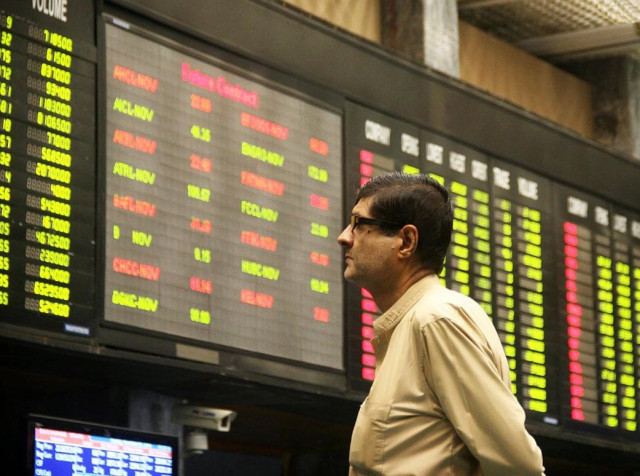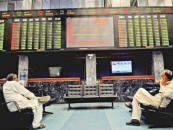PSX hits peak on new year optimism
KSE-100 marks 5.6% weekly surge; analysts see index reaching 160,000 in 2025

With new year euphoria, the KSE-100 index of Pakistan Stock Exchange (PSX) continued its bullish trajectory in the outgoing week, closing at a record high of 117,587 points and reflecting a 5.6% week-on-week (WoW) gain.
Average daily volumes surged by 31% WoW to 1,045 million shares, driven by improved investor sentiment and favourable macroeconomic developments, analysts said. The rally coincided with December 2024 inflation figures that dropped to a six-and-a-half-year low of 4.1% year-on-year (YoY), attributed to the base effect of last year's elevated prices. The first half of FY25 saw average inflation of 7.3%, significantly lower than the 28.8% recorded in the corresponding period of FY24.
Despite these positives, challenges remain, with the trade deficit swelling to $2.4 billion and the Federal Board of Revenue (FBR) reporting a tax shortfall of Rs386 billion in 1HFY25. On the external front, the State Bank of Pakistan's reserves dipped by $143 million, closing at $11.7 billion, the analysts said. Sector-wise, banks, fertilisers, and exploration & production companies emerged as top contributors, which accounted for 66% of the year's total index gains. Notable performers included Fauji Fertiliser Company (FFC, +6,086 points), Mari Petroleum (+3,977 points), and UBL (+3,957 points).
The government's announcement of the five-year "Uraan Pakistan" programme, aimed at sustainable economic growth, further bolstered investor confidence. However, risks such as geopolitical instability, fiscal pressures, and deviations from IMF-backed reforms could temper the market's momentum. As Pakistan's economy shows signs of recovery, the analysts are projecting continued growth, with expectations that the KSE-100 index will reach 160,000 points by the end of 2025, contingent on stable political and economic reforms.
On a day-on-day basis, the PSX on Monday experienced a remarkable surge as the year-end approached, when the KSE-100 soared by 3,908 points, or 3.5%, to 115,259, fuelled by investor optimism due to the potential for a single-digit policy rate along with expectations of rationalised government spending and continuous economic reforms. The positive sentiment was further aided by a strong rupee, rising exports and declining lending rates. The following day, Pakistan's stock market closed slightly under pressure, driven by institutional profit-taking in overbought stocks. The index recorded a loss of 132 points owing to global equity slump, subdued economic growth of 0.92% for July-September 2024, security challenges in Karachi, and foreign fund outflows.
On Wednesday, the PSX started the new year on a high note, with strong buying driving the index up by nearly 1,881 points to 117,008. Local and institutional investors sparked a buying boom, reflecting growing confidence in the country's economy.
On second last day of the trading week, a volatile but ultimately positive session unfolded at the PSX, as the KSE-100 surged over 1,000 points earlier in the day. The market hit an intra-day high of 118,368, bolstered by the release of December 2024's Consumer Price Index (CPI), which came in at a favourable 4.1%, the lowest since April 2018. At the end of the session, the index added 111.57 points and settled at 117,119.66.
On the last day of the week, the PSX closed on a bullish note as it rose past 117,500 points, fueled by strong earnings projections for the banking and fertiliser sectors.
Investors reacted positively to an expected robust payout in banking stocks, a 58% year-on-year (YoY) surge in December urea sales, and optimism about a potential cut in the State Bank of Pakistan's (SBP) policy rate. The index gained 467 points. The market surged by 6,236 points, or 5.6% WoW, emerging as the world's best-performing market in terms of US dollar returns.
Wadee Zaman of JS Research wrote that the KSE-100 continued with the bullish momentum, closing at its highest level at 117,587 points, gaining 5.6% WoW. Average volumes increased 31% WoW to 1,045 million shares. The week started with inflation data for December 2024, which clocked in at 4.1% YoY, marking the lowest reading in over 6.5 years. The decline was mainly due to the base effect of last year's elevated inflation.
Furthermore, he said, the trade balance numbers released during the week showed a significant deficit of $2.4 billion. The FBR's tax revenue collection stood at Rs5.6 trillion, showing a significant shortfall of Rs386 billion in 1HFY25.
In addition, the Ministry of Economic Affairs signed a $200 million loan agreement with the Asian Development Bank (ADB) for power distribution projects. Meanwhile, petroleum sales for December 2024 depicted an increase of 3% year-on-year (YoY), however, on a month-on-month (MoM) basis, sales recorded a significant drop of 19%.
Cement sales, on the other hand, depicted a 2% increase YoY. The increase was weighed down by a 5% decline in local dispatches while exports were up 49%, the analyst said.
The KSE-100 index posted a solid growth of 84%, adding 52,676 points during CY24. The main sectors driving the growth were banks, contributing 13,847 points, followed by fertilisers with 11,169 points and E&P with 10,012 points, Zaman added.
Arif Habib Limited (AHL) wrote in its report that the stock market remained jubilant throughout the week, with new year euphoria coming into play since the index closed at the highest-ever level of 117,587 points.
The government announced a five-year economic growth plan called "Uraan Pakistan", which aimed to achieve sustainable development and economic stability.
On the economic front, the inflation for December 2024 dropped to an 80-month low of 4.1%. Moreover, the National Accounts Committee released GDP growth rates for 1QFY25, where growth arrived at 0.92%, contributed by the expansion in agriculture and services sectors of 1.15% and 1.43%, respectively, AHL said.


















COMMENTS
Comments are moderated and generally will be posted if they are on-topic and not abusive.
For more information, please see our Comments FAQ